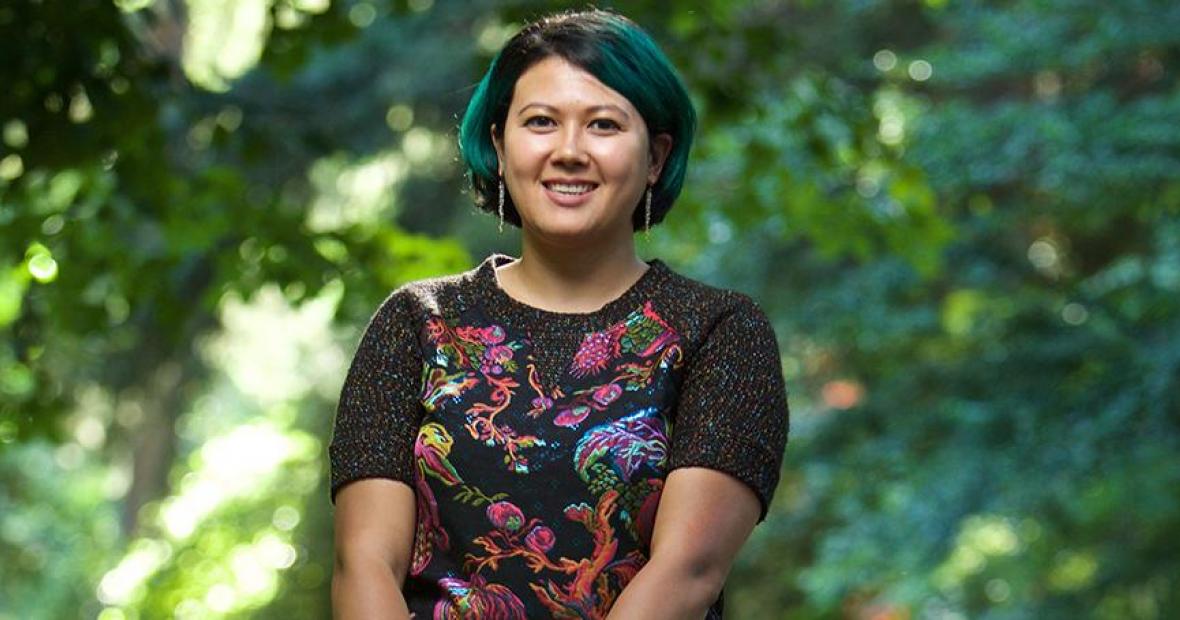Breaking Down Barriers in Tech
Terian Koscik ’12
Picture a techie — it’s likely you’re imagining a slightly out of shape young man hunched over a computer somewhere in California, rather than someone like Terian Koscik ’12. Koscik doesn’t fit the Silicon Valley mold: she’s a young woman, a person of color, somebody who doesn’t abuse the tech bromide about “making the world a better place,” but actually does it. Through her volunteer work, Koscik is helping make tech a more inclusive industry.
Koscik is a back-end developer for GitHub, a company based in San Francisco — but in her free time, she leads a Portland, Ore., chapter of Django Girls, a global nonprofit dedicated to empowering women and girls to learn to program. Through weekend workshops, mentoring programs, and online resources, the group helps women learn to code in a supportive environment. Some participants are women switching careers, others are teenage girls looking to explore a passion they feel they have to hide from their schoolmates. It is a space where people like Koscik are the rule rather than the exception.
“I volunteered teaching young girls to show them that it’s okay to be interested in this stuff,” says Koscik. When she first started learning HTML (Hypertext Markup Language) by spending a lot of time on the now-ancient online role-playing game Neopets, Koscik realized she was the only girl she knew who was interested in programming. “It would have been so easy to decide that if people who looked like me weren’t doing something, it probably wasn’t worth doing,” she says. For Koscik, Django Girls is a way to tell girls like her: “You can use computer skills to make pink flowers that light up, or an app about horoscopes, or Sailor Moon websites. Anything you love to make is OK.”
Django Girls isn’t Koscik’s first rodeo; she started volunteering at Grinnell, tutoring students enrolled in introductory computer science classes. Like the struggling computer science students she mentored in Iowa, many of the participants at Django Girls may not have previously “found a programming project that interests them, or had a teacher who was patient with them,” says Koscik. She believes her volunteer work can help underrepresented students get a start in an industry they often feel they can’t even approach.
Beyond helping young coders, the work Koscik does at Django Girls is improving the conditions faced by women who already work in tech. Because the field is so male-dominated, many women endure sexual harassment and hostile work environments. They are paid less, promoted less, and burn out faster. “With Django Girls, I don’t expect to fix everything,” Koscik says. “I just want to help some women get better paying jobs and maybe get enough of us into programming that we can overthrow the system a little faster.”
Ultimately, Koscik hopes that her efforts will lead to a greater proportion of women and minorities in the tech industry. “I want us to be paid better and in charge of more people and feel less obligated to donate our free time to fixing the fact that we are not welcomed here,” she explains. “My dream is that every child … gets to experience the kind of joy I felt at programming for the first time. We wouldn’t need organizations like Django Girls anymore because everyone who wants to program would be given the opportunity.”

